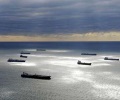

After Korea Development Bank (KDB) converted its HMM convertible bonds into stocks at the end of last month, market watchers are closely following the state-run bank’s moves regarding the global shipping company’s sizable shareholding.
HMM’s public disclosure last week showed that KDB exercised its right to convert 100 percent of the shipping company’s convertible bonds ― worth 300 billion won ($264 million) ― into 60 million common shares on Monday, resulting in the state-run lender now owning 24.96 percent of all HMM shares, or 101.1 million shares.
Convertible bonds are a type of bond that can be converted into a specified number of common stock shares.
The number of such bonds that were converted into stocks this time only accounted for around 22 percent of KDB’s entire holding of any HMM bonds. The state-run lender still owns 208 million perpetual bonds issued by HMM, which offers the bank a fixed-rate interest with no maturity date.
Now the central question is whether KDB will attempt to retrieve about 3 trillion won it injected to ensure the shipping company’s survival five years ago, by either selling its stocks or the company. Various conglomerates such as POSCO, Hyundai Motor Group and Hyundai Heavy Industries are tapped as possible candidates for the acquisition.
Unsurprisingly, KDB said nothing has been decided for the time being. The conversion of HMM’s convertible bonds in June was only because the pre-determined period allowing the conversion was set to expire at the end of last month.
“KDB plans to comprehensively assess the issue and examine options,” a KDB official said by telephone. “It’s still too early to say anything about the bank’s further plans, such as the sale of HMM. The remaining matters will be decided, after a thorough examination.”
Given that the converted bond’s price was 5,000 won per ordinary share, KDB last week took 2.3 trillion won worth of profit, or some 780 percent in terms of return ratio, as HMM’s closing price was 44,800 won. The newly issued stocks will begin to be traded on the KOSPI market within around two weeks.
Some observers expressed concerns over whether HMM’s stock price would falter further due to dilution of stocks due to the new stocks owned by KDB and a possible massive block sale that could follow. The question is even more relevant, when considering the stock’s price increased by nearly 10 times over the past year. This year alone, the stock price has nearly tripled, as fees for global shipping containers skyrocketed on the back of increased shipping demand triggered by COVID-19.
However, market analysts say any stock dilution from hanging issues will likely be limited.
“A possible sale of HMM won’t have much impact in determining the direction of the stock’s movement. The core of the global shipping industry is dependent on sales and trading of ships,” a recent report by eBest Investment & Securities stated.
Other market reports also pointed out that marine shipping fees are on a structural increase, as global harbor volumes continue to rise. HMM’s revenue for the second quarter is expected to reach 2.5 trillion won, which is a 20.46 percent jump from the previous quarter. The operating profit for the second quarter is forecast to be around 1.2 trillion won, an 84 percent hike from the first quarter.
Source: The Korea Times